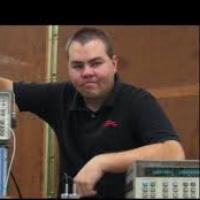SystemX Affiliates: login to view related content.

In this talk we will first introduce the exciting Earth science, planetary science and astrophysics investigations that are performed by JPL and NASA at millimeter-wave and terahertz frequencies, describing several recent results by instruments operating in this wavelength regime. Then we will then discuss the important role CMOS system-on-chip (SoC) technology now plays in these instruments for LO generation, and signal processing, and the fundamental challenges (noise, extreme temperatures and radiation effects) that CMOS based instruments face in delivering the high level of fidelity required for NASA’s science investigations. The talk will discuss several examples of CMOS SoC-based instruments from NASA programs including a 600 GHz side-band separated spectrometer being developed for investigations of Europa, Titan, Enceladus, and a 100 GHz in-situ spectrometer system for investigation of volatiles ejected from comet and asteroid surfaces. Additionally we will discuss several NASA radiometer instruments based on CMOS technology for observing Earth’s atmosphere to diagnose precipitation and extreme weather events.
Adrian Tang has over 16 years of CMOS/SiGe IC chip design experience in both research and commercial wireless environments with projects ranging from the design of commercial Bluetooth and WLAN chipsets to mm-wave and THz chipsets for communication, radar and spectrometer systems. At NASA's Jet Propulsion Laboratory, Adrian currently directs the space-system-on-chip laboratory and is currently leading development of a wide range of CMOS SoC chipsets for planetary, Earth science and Astrophysics space instruments including sub-millimeter-wave fractional carrier generators and spectrometer processors for sub-mm-wave remote sensing instruments, as well as waveform generation and processing for in-situ and orbital mm-wave radar systems. Adrian's CMOS SoC design team was the first to demonstrate centimeter accurate mm-wave radar for sensing snow and precipitation with silicon technology, the first to demonstrate CMOS spectrometers sensitive enough to detect trace gasses, and the first to demonstrate CMOS radiometers with enough sensitivity to support atmospheric humidity and temperature soundings. Adrian completed his PhD at the University of California Los Angeles in 2012 before joining JPL in 2013 as a strategic researcher. Adrian was recently awarded the SPIE (optical society) rising researcher award in 2016 for his work on mm-wave radiometers, as well as the 2016 JPL Explorer award, and 2016 NASA JPL R&TD research award, both for his work on CMOS-based gamma radiation sensors. Adrian is a senior member of the IEEE.


